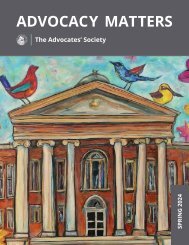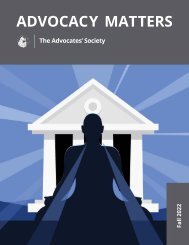Advocacy-Matters-Winter-2024
Keep up to date on what your fellow Society members have to say in Advocacy Matters.
Keep up to date on what your fellow Society members have to say in Advocacy Matters.
You also want an ePaper? Increase the reach of your titles
YUMPU automatically turns print PDFs into web optimized ePapers that Google loves.
senior lawyer for delay and interference at the examinations of the defendants. Since the plaintiffs’ lawyer<br />
chose to end the examinations early even though the representatives were ready to continue and<br />
answer questions, Justice Fraser rejected his request to make the defendants re-attend for discovery. In<br />
his endorsement, Justice Fraser awarded substantial indemnity costs to the defendants in the amount<br />
of $25,284.37. Justice Fraser accepted that costs on a substantial indemnity basis were warranted on<br />
account of plaintiffs’ counsel’s conduct being a “marked and unacceptable departure from the standard<br />
of reasonable conduct which is expected of a player in the judicial system.”<br />
These decisions are an important reminder that the rules of civility will be enforced throughout the<br />
discovery and litigation process and that there are consequences for ill-mannered behavior.<br />
Unfortunately, opposing counsel sometimes engage in tactics to get under our skin and prompt an<br />
uncivil response. Resist the temptation. As Craig Lockwood, litigation partner at Osler, advises: “When<br />
engaged in a disagreement with counsel, simply state your position and move on. Don’t let your emotions<br />
get the best of you. At the same time, if someone else is being unfair to you, stand your ground.”<br />
Paul Barnes, senior legal counsel at Intact Insurance, agrees it’s important not to give into anger and<br />
keep a normal tone of voice, “kind of how Luke Skywalker refused to give into the temptation of the dark<br />
side of the force at the end of Return to the Jedi”. Barnes qualifies this advice by saying that sometimes<br />
it is justified to terminate a discovery and obtain instructions from the court, but only in the clearest of<br />
circumstances. The Singh case was not one of those circumstances.<br />
At the end of the day, lawyers would be wise to heed Justice Rahman’s warning in Singh that, “the way<br />
we behave inside a boardroom might make its way before a judge. And the judge might see things very<br />
differently than they do”.<br />
The Advocates’ Society has published Principles of Civility and Professionalism for Advocates to foster civil<br />
and professional conduct in our adversarial justice system, and thereby improve the administration of<br />
justice. The Principles include information about an advocate’s duty to opposing counsel and best practices<br />
for examinations, cross-examinations, and questioning.<br />
28<br />
29

















